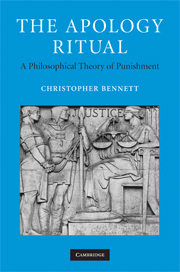1 - The problem of punishment and the restorative alternative
Published online by Cambridge University Press: 22 September 2009
Summary
today's CRIMINAL JUSTICE: A LEGITIMATION CRISIS?
Penal justice can be described as a set of institutions in search of a narrative or a ‘practice without a policy’. Many writers talk of a crisis in the system. This crisis has a number of aspects – for instance, how to cope with overcrowded prisons; how to cope with perceptions of rising crime that seem to be independent of the evidence; how to sustain liberal and progressive values in the face of an entrenched popular ‘law and order’ mentality that politicians use for their own advantage – that I will not deal with here. What I want to address might rather be called a crisis of meaning. It seems that for many victims and offenders, and often for the officials who run the institutions, it is not clear what the system is actually meant to be doing, what the overall purpose of criminal justice is – or whether the officially given purposes are really compelling ones. In this section I will give an explanation of this state of affairs by looking at some of the persistent problems plaguing the central justifications of penal institutions. I propose that one of the reasons for a loss of faith in the penal system stems from the fact that none of these narratives is able to attract and sustain the overall support of those who are involved in it. This disillusion can be traced to deficiencies, apparent or real, in the narratives themselves.
- Type
- Chapter
- Information
- The Apology RitualA Philosophical Theory of Punishment, pp. 13 - 25Publisher: Cambridge University PressPrint publication year: 2008



